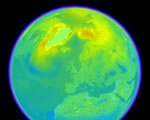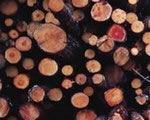 Go to main content
Go to main content
Archive Website of the UK government
Please note that this website has a UK government accesskeys system.
Main menu
Page menu
Environment and greener living

Causes of climate change

There is very strong evidence that people are changing the climate with actions that create emissions of greenhouse gases like carbon dioxide and methane. In the UK, 40 per cent of CO2 emissions are caused by individuals, mostly from energy used in the home, driving and air travel.
The role of humans in climate change

Human activity is the main cause of the changes seen in climate
The world's climate varies naturally as a result of:
- the way the ocean and the atmosphere interact with each other
- changes in the Earth's orbit
- changes in energy received from the sun
However, there is now very strong evidence and almost universal agreement that significant recent global warming can’t be explained just by natural causes. The changes seen over recent years, and those predicted for the next century, are considered to be mainly the result of human behaviour.
The Intergovernmental Panel on Climate Change (IPCC) is a scientific body set up by the UN to look at climate change. It says that human activity is the main cause of the changes seen in climate during recent decades.
In the last 100 years, the Earth has warmed by 0.75 degrees Celsius. Global sea levels have gone up, glaciers and sea ice have melted, and extreme weather events, like floods and droughts, are likely to happen more often.
You can find information on climate change facts and myths on the Royal Society website.
The greenhouse effect
The Earth's atmosphere contains gases that trap heat near the Earth's surface. These so-called ‘greenhouse gases’ are necessary to sustain life on Earth. They let the sun’s rays enter but stop some heat from escaping to outer-space. This keeps the planet warm enough to allow life to thrive.
However, as people cause more greenhouse gases to be released into the atmosphere, the greenhouse effect becomes stronger. More heat is trapped and the Earth's climate begins to change unnaturally.
Greenhouse gases, including carbon dioxide
Greenhouse gases include water vapour, carbon dioxide and other gases like methane and nitrous oxide.
Carbon dioxide (also known as CO2) is the most important greenhouse gas after water vapour and contributes strongly to the greenhouse effect. Since the Industrial Revolution, which began in the 18th century, the amount of CO2 in the atmosphere has increased by about 40 per cent. The concentration of CO2 in the Earth's atmosphere is now higher than at any time in at least the last 800,000 years.
Causes of the greenhouse effect

Deforestation produces 18 per cent of global CO2
Human activity is changing the amount of greenhouse gases in the atmosphere in three important ways.
Burning fossil fuels
When fossil fuels like coal, oil and gas are burned, they release greenhouse gases. In 2005, burning fossil fuels sent about 27 billion tonnes of carbon dioxide into the atmosphere.
People burn fossil fuels to create energy, which is used for many things including:
- heating homes and buildings
- growing, transporting and cooking food
- travelling (for example, by car, plane, bus and train)
- treating water to make it drinkable, heating it and piping it into homes
- manufacturing, using and transporting products, from clothes to fridges, from plastic bags to batteries
Deforestation
Cutting down forests faster than they are replaced (deforestation) is a major contributor to climate change. It accounts for about 20 per cent of human carbon emissions – more than the entire global transport sector produces.
Deforestation makes such a huge contribution to carbon emissions because trees absorb CO2 as they grow. The more trees that are cut down, the fewer there will be left to absorb CO2, leading to it building up in the atmosphere.
In addition, the agriculture and industry that replace the forests often cause an extra problem by producing carbon emissions of their own.
A growing world population
As the world’s population grows, there are more people who need food, livestock and energy. This increasing demand will lead to increasing emissions.
Sources of UK emissions
Emissions of greenhouse gases in the UK come from many sources:
- 65 per cent come from burning fuel to create energy (excluding transport)
- 21 per cent are from transport
- around 8 per cent are from agriculture – mainly nitrous oxide from nitrogen fertilisers or methane given off by animals and manure
- 4 per cent come from industry – for example, manufacturing goods
Your carbon footprint
About 40 per cent of emissions in the UK are caused by individuals. From home heating to drinking water and from clothes to computers – anything that needs energy to produce, transport or use will release greenhouse gases.
The biggest sources of emissions for most people are likely to be:
- using energy in the home (mainly for heating)
- driving
- air travel
The amount of emissions you’re personally responsible for is known as your carbon footprint. You can work out your carbon footprint by using the ACT ON CO2 carbon calculator.
What you can do
To help tackle climate change, everyone needs to try and reduce their carbon footprint.
There are many simple ways you can do this – for example, switching appliances off standby or walking short journeys instead of using the car. For simple tips on cutting your carbon footprint and saving energy, see ‘Top tips on saving energy’. For tips on living a greener life, including cutting your carbon footprint, see 'Greener living: a quick guide to what you can do'.
 Facebook
Facebook Twitter
Twitter StumbleUpon
StumbleUpon Delicious
Delicious Reddit
Reddit
